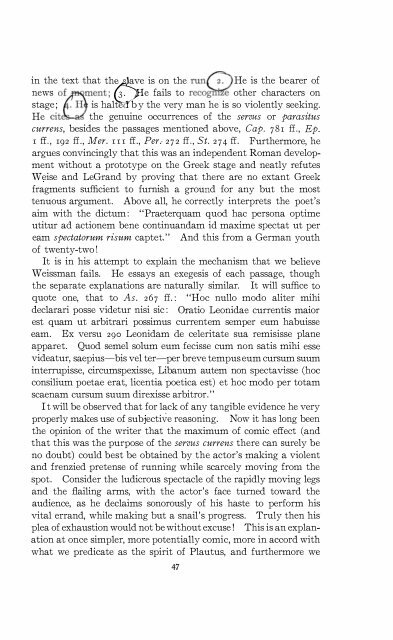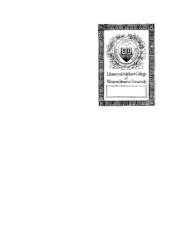You also want an ePaper? Increase the reach of your titles
YUMPU automatically turns print PDFs into web optimized ePapers that Google loves.
in the text that thave is on the runt;:) He is the bearer of<br />
news of ment ; 3. e fails to reco other characters on<br />
stage; I is halte by the very man he is so violently seeking.<br />
He cit the genuine occurrences of the servus or parasitus<br />
currens, besides the passages mentioned above, Cap. 781 ff., Ep.<br />
I ff., 192 ff., Mer. III ff., Per.· 272 ff., St. 274 ff. Furthermore, he<br />
argues convincingly that this was an independent Roman development<br />
without a prototype on the Greek stage and neatly refutes<br />
Weise and LeGrand by proving that there are no extant Greek<br />
fragments sufficient to furnish a ground for any but the most<br />
tenuous argument. Above all, he correctly interprets the poet's<br />
aim with the dictum : "Praeterquam quod hac persona optime<br />
utitur ad actionem bene continuandam id maxime spectat ut per<br />
eam spectatorum risum captet." And this from a German youth<br />
of twenty-two !<br />
It is in his attempt to explain the mechanism that we believe<br />
Weissman fails. He essays an exegesis of each passage, though<br />
the separate explanations are naturally similar. It will suffice to<br />
quote one, that to As. 267 ff. : "Hoc nullo modo aliter mihi<br />
declarari posse videtur nisi sic : Oratio Leonidae currentis maior<br />
est quam ut arbitrari possimus current em semper eum habuisse<br />
eam. Ex versu 290 Leonidam de celeritate sua remisisse plane<br />
apparet. Quod semel solum eum fecisse cum non satis mihi esse<br />
videatur, saepius-bis vel ter-per breve tempus eum cursum suum<br />
interrupisse, circumspexisse, Libanum autem non spectavisse (hoc<br />
consilium poetae erat, licentia poetica est) et hoc modo per totam<br />
scaenam cursum suum direxisse arbitror."<br />
It will be observed that for lack of any tangible evidence he very<br />
properly makes use of subjective reasoning. Now it has long been<br />
the opinion of the writer that the maximum of comic effect (and<br />
that this was the purpose of the servus currens there can surely be<br />
no doubt) could best be obtained by the actor's making a violent<br />
and frenzied pretense of running while scarcely moving from the<br />
spot. Consider the ludicrous spectacle of the rapidly moving legs<br />
and the flailing arms, with the actor's face turned toward the<br />
audience, as he declaims sonorously of his haste to perform his<br />
vital errand, while making but a snail's progress. Truly then his<br />
plea of exhaustion would not be without excuse ! This is an explanation<br />
at once simpler, more potentially comic, more in accord with<br />
what we predicate as the spirit of Plautus, and furthermore we<br />
47
















